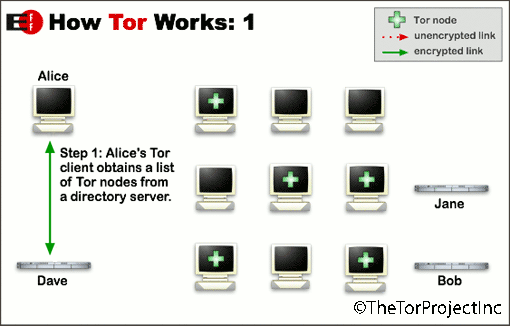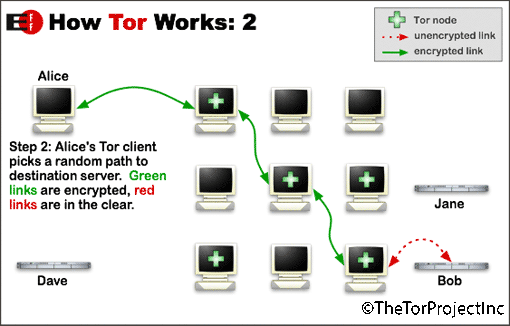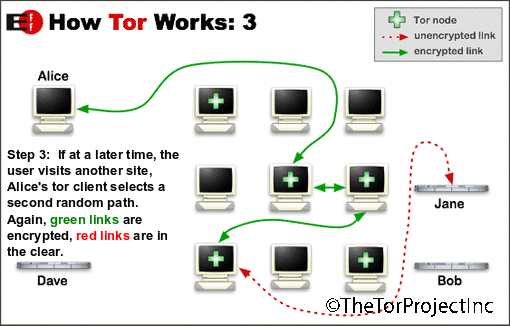
VPN or Tor – which is best? Well, if you’ve ever looked into boosting your internet privacy, at some point you’ll probably have come across a recommendation to use Tor. In fact you’ve probably seen various conflicting articles about it – some saying it’s the best thing since sliced bread and others warning everyone to steer clear. Getting to the truth of the matter can be a headache, so if you’re confused about what Tor is and whether you should be using it, read on!
What is Tor?
The Onion Router, universally known as Tor (yes – Tor, not TOR), is free software developed by The Tor Project Inc which aims to allow users to browse the internet in full privacy. To achieve this, the Tor browser routes all internet traffic through a series of randomly chosen relays. These multiple relays are like the layers of an onion – hence the name. Each individual relay represents a twist in the path your data travels, and they are reset at least every 10 minutes, making it virtually impossible for anyone to trace a connection back to you.
Each of these relays is run by a volunteer – indeed the whole Tor network is community-run. The sheer number of individual volunteer-nodes spread far and wide, means that Tor can justifiably claim to be practically snoop-proof – and no single organization or government has the jurisdiction to shut it down. Think digital labyrinth – the more twists and turns, the harder to follow – and in this regard, Tor does very well.
Sounds good – what’s the catch?
Sounds great, right? Total anonymity, without paying a penny.
Well, not quite. While Tor is certainly a viable option to hide your tracks, there are a number of downfalls. These won’t matter to everyone, but many users may find that Tor alone simply isn’t right to do the job they want. Let’s take a look at some of the issues…
Ineffective Location-Spoofing
If you’re looking for a way to change your apparent location when viewing geo-locked sites, Tor is not much help. While your connection will indeed appear to be coming from the location of the final node in the chain, for the most part you’ll have little control over where this actually is.
So, if you’re looking for a way to unblock Netflix, for example, Tor is not what you need – you’ll definitely want to go for a streaming-optimized VPN package with a good SmartDNS offering.
Exit Node Vulnerability
This is a relatively small risk, but a real one. While your data is passed from relay to relay, it is encrypted so that each link in the chain can only see the two links either side. So, at any one point on the route your connection takes, anyone looking can only see one step back or forward. That is, until your data reaches its final node or ‘exit relay’. At this point your data is necessarily decrypted in order to interact with the site to which you’re connecting.
Since the network of Tor nodes is entirely made up of volunteers, there’s no real oversight as to who is on the end of each node. So, potentially, a malicious volunteer can see your unencrypted data and do with it as they please. While they are unable to trace the data back along the maze to your computer, any sensitive personal or financial information (which is liable to reveal your identity) you send or receive could be seen or logged.
Hopefully the vast majority of volunteers are not malicious. However there is no way to know for sure who is operating that exit node.
Surveillance Red-Flag
This issue is somewhat controversial, and opinions differ wildly as to whether this is a genuine risk, but either way its worth considering.
The argument goes that by downloading the Tor software, or perhaps even by looking into it, you are making yourself a target for surveillance by any of a number of authorities (NSA, MI5 etc). Essentially the theory is that, because Tor can potentially be used to carry out illegal activity, anyone who wants to use it is a potential criminal who should be looked into. It might sound like foil-hat paranoia, but there is some real evidence that this type of targeting goes on – not least in documents leaked by Edward Snowden which show how the NSA specifically targeted malware at Tor users. Like it or not, we live in an age in which many governments feel that anyone who seeks privacy must have something to hide.
Of course there are literally millions of Tor users, and it seems unlikely that any agency could be actively watching all of them. Furthermore, VPNs are just as vulnerable to this type of targeting, so whichever path you choose towards internet privacy, there is no perfect solution. Obviously the best approach is to steer well clear of any illegal activity, no matter what type of privacy protection you have.
Speed
If none of the other problems with Tor bothered you much, this may be the deal-breaker. Tor is slow. Seriously slow.
Remember all those volunteer relays that twist your data along an unnavigable maze? Well, they each have only limited bandwidth to offer, and in order to remain anonymous, your connection has to pass through a lot of them. This means that any plans you may have to stream video or download torrents will quickly become unbearable frustrating. If you’re old enough to remember dial-up internet you’ll have a pretty good idea what we mean (ok, we’re exaggerating slightly, but it really is slow!).
Besides which, using Tor for streaming or P2P file sharing is generally considered pretty bad form. As a community-run network, Tor users take a dim view of anyone clogging the network with heavy bandwidth-demanding applications. Tor simply isn’t designed to be used in this way, and doing so can have a real impact on those who legitimately need the anonymity the network provides.
So… is a VPN better than Tor?
If you’ve read this far, you might be wondering why anyone would use Tor over a good VPN service. Make no mistake though, we’re not here for a Tor-bashing – the simple fact is that these two options have different practical applications. What you intend to do online will dictate which tool is right for the job. If you’re still not sure, take a look at the following pros and cons.
VPN Pros
- Speed: When you connect to a good VPN, your speed and bandwidth are only limited by what your ISP provides – in other words, most of the time your internet should be no faster or slower than it would be without a VPN. This means streaming or downloading large files is a breeze, and you won’t be hanging around waiting for pages to load.
- Unblocking Content: Connection with a VPN allows you to choose the location of the server your data is routed through – making it possible to change your apparent country of origin when streaming media on sites like Netflix, iPlayer, Spotify and many others.
- Flexible Security: VPNs encrypt your data throughout its route, and there are many providers who keep no logs whatsoever of your activity. When you connect with a VPN, everything you do online, including any connections from applications other than your web browser, is protected.
- Compatibility: Most VPN providers offer apps to use on your smartphone, tablet and computers, as well as relatively easy set-up on your router so that you can keep all devices protected.
Tor Pros
- Price: Tor is, and will always be, FREE. This is a core principal of The Tor Project Inc – the software was designed to ensure that anyone needing a way to use the internet anonymously has the option. From political dissenters and victims of censorship in authoritarian states, to journalists needing protect sensitive sources, to pretty much anyone in the world, Tor is an open resource regardless of circumstances.
- Anonymity: Since there is no need to sign up or open an account to use Tor, it is arguably more anonymous than a VPN. The Tor network is also larger and more widespread than any single VPN provider, making it less vulnerable to government interference.
- Ease-of-Use: The Tor software is essentially an altered version of Firefox web browser. Simply download, install, and you’re ready to go.
VPN Cons
- Price: all quality VPN providers charge a monthly fee – this is what allows them to run servers with unlimited bandwidth. However, the cost can be reduced massively by paying in yearly rather than monthly instalments – some are less than £1.50 a month.
- Anonymity: To connect to a VPN service you’ll need to create an account and set up payment – this could potentially mean handing over some personal information. Since VPNs are legitimate businesses, in certain jurisdictions they may be compelled by law to log certain activities. However, there are many providers based in countries where this is not an issue, so for the privacy conscious there are secure VPNs that certainly compete with Tor on anonymity.
Tor Cons
- Speed: As discussed above, Tor can be pretty sluggish when browsing the web, and is not designed for heavy duty bandwidth.
- No Streaming/P2P: Video streaming and P2P filesharing, while not actively prohibited, are strongly discouraged as they reduce network performance for all users.
- Compatibility: As it is essentially a modified browser, Tor can’t be installed on a router and as yet there are no apps for smartphone operating systems. Anything you do online outside of the web browser is not protected.
Our Recommendation…
We’ve seen that Tor can be a valuable resource, offering an excellent standard of anonymity, though not without risks. For the majority of everyday users, the level of privacy Tor offers is not worth the downside. Meanwhile, a good VPN provider can offer excellent security as well as virtually unlimited data traffic at high speeds – but its important to find one that won’t log your activity. If what you’re looking for is 100% privacy, you’re out of luck – neither Tor nor a VPN can guarantee this. However, if you use both tools sensibly, you can get pretty close.
Our recommendation? Get yourself a reliable, secure VPN (this need not be expensive!) for everyday use. Then, if you’re in need of a security boost when sending or receiving some extra-sensitive data, use Tor as well. Combined effectively (see how to safely use both Tor and VPN), these tools will reduce the risk of anyone intruding on your privacy to almost none.



I think I need a vpn as spotify wont let me sign up. Would a VPN like from arcvpn work?
Hi Owen,
It will depend on the specific problem you’re having with Spotify, but certainly a VPN can be useful in unlocking region-specific content libraries on streaming services like Spotify and Netflix.
Check out our list of top recommended VPNs for Streaming to compare the best services.